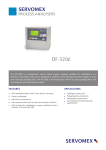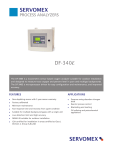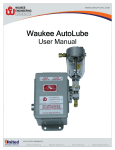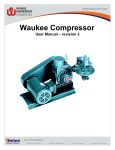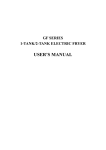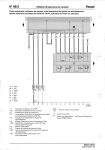Download Aurora Trace Startup and Shutdown Procedure for Sample System
Transcript
GE Measurement & Control Startup and Shutdown Procedure for Aurora Trace Sample System with Aspirator 916-136, Rev C May 2013 Startup Procedure To start your sample system, refer to the figure below and complete the following steps: : 7 26 23 5 24 22 1 4 11 21 9 3 8 25 10 6 12 2 Aurora Trace Sample System with H2O Verifier Option Using Aspirator 1100 Technology Park Drive Billerica, MA 01821-4111 Web: www.ge-mcs.com Startup Procedure for Aurora Trace Sample System May 2013 Table 1: Figure Key 2 of 4 1 Sample Gas Isolation Ball Valve 2 Verifier Bypass Valve 3 Sample Gas Bypass Metering Valve 4 Sample Gas Pressure Regulator 5 Sample Gas Pressure Gauge 6 Back Pressure Regulator 7 Orifice Upstream Pressure Gauge 8 Multi-Pass Cell Flow Meter 9 Sample Bypass Flow Meter 10 Process/Test 3-Way Valve 11 Aspirator Supply Pressure Regulator 12 Aspirator Supply Pressure Gauge 21 Verifier Isolation 3-Way Valve 22 Verifier Isolation Ball Valve 23 Verifier Bypass Metering Valve 24 Purifier Isolation Ball Valve 25 Purifier Isolation Ball Valve 26 Verifier Bypass Flow Meter 916-136C May 2013 1. Before connecting the unit to a gas supply at sample inlet port, ensure Sample Gas Isolation Ball Valve (Item #1) is closed. Make sure all mechanical connections have been properly installed according to section 2.7 in the User’s Manual. Required connections: sample inlet and pump discharge. 2. Warm-up Aurora Trace analyzer and verifier. a. Make sure power supply lines for Aurora Trace analyzer and multi-pass cell heater have been wired properly according to Section 2.7 in the User’s Manual. b. Turn on power supply for Aurora Trace analyzer. (This will warm up the verification system and stabilize Aurora Trace analyzer laser temperature.) c. Make sure Aspirator Supply Pressure Gauge (Item #12) reads zero. If not, fully turn Aspirator Supply Pressure Regulator (Item#11) counterclockwise so that Item#12 reads zero. Then, turn on power supply to the multi-pass cell heater. (This will warm up the multi-pass cell.) 3. Set up valves positions. a. Open Items #21 and #22 (Verifier Isolation 3-way Valve, handle pointing inward, Verifier Isolation Ball Valve). b. Fully close Item #2 (Verifier Bypass Valve). c. Fully close Item #3 (Sample Gas Bypass Metering Valve). d. Close Item #23 (Verifier Bypass Metering Valve). e. Open Items #24 and #25 (Purifier Isolation Ball Valves). f. Make sure Process/Test 3-way Valve (Item #10) handle points upward. 4. Set upstream pressure to 50 psig. If an electrically heated Sample Gas Pressure Regulator (Item #4) is installed in Aurora Trace sample system, follow these steps: a. Locate junction box for setting temperature of the heated Sample Gas Pressure Regulator (Item #4). It is right below the heated Sample Gas Pressure Regulator marked as #4. 916-136C Startup Procedure for Aurora Trace Sample System b. Open junction box cover. Make sure temperature is set mid-scale. If not, use a flat head screw driver to set mid-scale. Allow 15 minutes to warm up.Remove the cap covering the Sample Gas Pressure Regulator adjustment screw (Item # 4). c. Remove the cap covering the Sample Gas Pressure Regulator adjustment screw (Item #4). d. Using a 5/32” hex driver, turn the regulator adjustment screw fully counter-clockwise (minimum pressure output). e. Open Item #1 (Sample Gas Isolation Ball Valve). f. Turn the regulator adjustment screw slowly clockwise while observing Item #5 (Sample Gas Pressure Gauge) to 50 ±5 psig. g. Slowly open Item #3 (Sample Gas Bypass Metering Valve) until the desired flow is achieved at Item #9 (Sample Bypass Flow Meter). h. If Sample Gas Pressure Gauge (#5) pressure reading oscillates, go back to step b and increase temperature set point to the next level. Allow 15 minutes to warm up. If Sample Gas Pressure Gauge (#5) becomes stable, raise temperature set point one more level, then close junction box. If not, repeat above process until Sample Gas Pressure Gauge (#5) is stable and then raise temperature set point one more level, then close junction box. i. Try to avoid setting the heated Sample Gas Pressure Regulator (Item #4) to its maximal temperature, if possible. The heated Sample Gas Pressure Regulator (Item #4) could be overheated if set at maximal temperature for an extended period of time when there is no gas flowing through it. If a standard un-heated, Sample Gas Pressure Regulator (Item #4) is installed in the Aurora Trace sample system, follow these steps: a. Turn the Sample Gas Pressure Regulator (Item#4) fully counter-clockwise (minimum pressure output). b. Open Item #1 (Sample Gas Isolation Ball Valve). 3 of 4 Startup Procedure for Aurora Trace Sample System c. Turn the Sample Gas Pressure Regulator (Item#4) slowly clockwise while observing Item #5 (Sample Gas Pressure Gauge) to 50 ±5psig. d. Slowly open Item #3 (Sample Gas Bypass Metering Valve) until the desired flow is achieved at Item #9 (Sample Bypass Flow Meter). 5. Turn Aspirator Supply Pressure Regulator (Item #11) clockwise so that Aspirator Supply Pressure Gauge (Item#12) reads 65+/-2psig (Air Inlet pressure should be 85psig minimum). 6. Set up verification system's orifice flow and bypass flow. a. Go to Aurora Trace display Main Menu/ Settings/Verifier/Diags. b. Check the following readings: • Perm tube temperature (Prf): warming up to 50°C • Preheat temperature (Mnf): warming up to 50°C • Orifice Flow (Orf): controlled at 1860 sccm c. Slowly adjust Verifier Bypass Metering Valve (Item #23) so that Verifier Bypass Flow Meter (Item #26) reads 48 LPH (1.7 SCFH). d. Wait until Orifice Flow (Orf) stable at 1860 sccm on display. e. Adjust Item #23 slightly so that Item# 26 reads 60 LPH (2.1 SCFH). f. Repeat d and e so that Item #26 reads 60 LPH (2.1 SCFH) and Orifice Flow (Orf) stable at 1860 sccm on display. 7. Adjust internal sample pressure to 2.5 psia. Make sure sample pressure reading (psia) is configured on Aurora Trace display. a. Adjust Item #6 (Back Pressure Regulator) so that Item #7 (Orifice Upstream Pressure Gauge) reads 12 psig. b. Allow 15 minutes for system pump down. c. Observe Item #8 (Multi-pass Cell Flow Meter) to be at full scale. 4 of 4 May 2013 d. Adjust Item #6 (Back Pressure Regulator) while observing the sample pressure reading on the unit display. Set the pressure to read 2.5±0.1 on the display. e. Re-install the pressure regulator adjustment screw cap if an electrically heated Sample Gas Pressure Regulator (Item #4) is installed in the Aurora Trace sample system. Shutdown Procedure 1. Fully turn Aspirator Supply Pressure Regulator (Item#11) counter-clockwise so that Aspirator Supply Pressure Gauge (Item#12) reads zero. 2. Close the Sample Gas Isolation Ball Valve (Item#1) to depressurize the system. Monitor the Sample Gas Pressure Gauge (Item #5) to drop to zero. 3. Turn the Sample Gas Pressure Regulator (Item #4) fully counter-clockwise. 4. Turn the Back Pressure Regulator (item #6) fully counter-clockwise. 5. Close the following valve(s): Item #3 Sample Gas Bypass Metering Valve Item #21 Verifier Isolation 3-Way Valve Item #22 Verifier Isolation Ball Valve Item #23 Verifier Bypass Metering Valve Item #24 Purifier Isolation Ball Valve Item #25 Purifier Isolation Ball Valve Total sample gas flow rate from Aurora Trace outlets are flow rate from Sample Bypass Flow Meter (# 9) plus flow rate through multi-pass cell. Flow rate through multi-pass cell is the flow rate drawn by aspirator. Flow rate drawn by aspirator varies from unit to unit, but it cannot exceed 1.86 slpm when a verification system is installed. Sample systems for trace moisture applications will require some time to “dry-down” for reaching the actual process moisture level. Typically 12-24 hours operation with process gas flowing at normal flow rates will “dry” the system, but this will vary depending on process conditions, length of tubing runs and storage conditions for the Aurora Trace prior to installation. Once the analyzer has reached process moisture levels, it is recommended to run the verification cycle 6-8 times to ensure all components within are adequately dry to provide accurate verification cycle values. 916-136C




